The new mix continues where volume 1 left off: the crossroads of African pop, afrobeat, soul and funk and innovations in western dance music; introducing Korg, Moog and other synths into the sound of African bands that were often based in the African diaspora of France, Germany or USA. Crossing borders and skipping across oceans, there’s a common thread in all this music. And remember – while you may not hear any rap music here, this exercise in digging into the legacy of modern African music is part of the core thought in hip hop, ever since Afrika Bambaataa started spinning African tunes in his sets in the late 70s.
Listen to this vinyl-only mix below, download to your computer (use the Soundcloud download link) and read the interview with Dj Gioumanne here. We also created ‘liner notes’ with some info about most songs on the playlist; the extended version of these notes (with info about every track, and sleeve pics) can be read below.
And if you want to listen to more eighties Euro-Afro sounds, check out the Smokers & Shakers mix on the Dailyleftover blog.
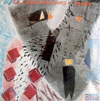 CK & The Beat Merchants – Nii me ba
CK & The Beat Merchants – Nii me ba
The only album by CK Ladzekpo and the Beat Merchants, released in 1986 in California, was among the first batch of African records being marketed as ‘world music’ or ‘world music’ as the liner notes call it. Most songs are ’80s American pop soul with a heavy influence of Ghanaian music, with ‘Nii me ba’ being the standout track. Nigerian Joni Haastrup, who recently got due credit as his Monomono albums were reissued, is heard on backing vocals.
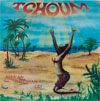 Tchoum – African Woman Cry
Tchoum – African Woman Cry
This forgotten gem resurfaced recently in the attic of a French-African music label, where a box of sealed copies found its way into the hands of a new generation of young European vinyl collectors—possibly the same guys that fought over last year’s 300 copies only reissue of William Onyeabor’s holy grail Afro synth album Good Name (two months later, the ‘limited’ edition was released again in a run of several thousand copies for half the price—such is the tragedy of record collecting).
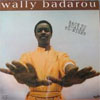 Wally Badarou – One day won’t give it away
Wally Badarou – One day won’t give it away
The Benin-born world citizen is a legend for his work with Level 42, Grace Jones, Mick Jagger and many more, but his mid-’80s solo output was huge in Nigeria and other African countries, especially the song ‘Hi-life’ which was recently sampled by Nigerian Afrobeats star J Martins. His first album Back to scales to-night from 1981 is little known, though it has at least two big tunes that reveal his trademark keyboard sound which he introduced to Level 42 the next year.
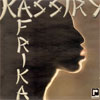 Kassiry – Kou Douw
Kassiry – Kou Douw
Ivorian artist Keke Kassiry was one of a handful of artists produced by Spanish fashion designer Paco Rabanne, well known for the fragrances that carry his name. Other artists on the Paco Rabanne Design label included disco group M’bamina but Kassiry was most prolifient. Upon his return to Ivory Coast it was rumored that Kassiry would have had a relationship with Rabanne, though the artist denied it.
 Contact – Don’t Be a Fool
Contact – Don’t Be a Fool
Kassav’, the French-Antilles origin band based in Paris that brought the zouk sound to an international audience, released their first album in 1979. A small label in USA released the album on that side of the ocean, but with two remixed songs in which the lead vocal was in English instead of French. Those songs were also released in France but under a different name on this obscure single.
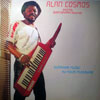 Alan Cosmos and his Bam-baara Soundz – Yebi/Fontonfrom
Alan Cosmos and his Bam-baara Soundz – Yebi/Fontonfrom
Obscure German release from the mid-’80s that may have spent the last 30 years waiting in the discount section of the record store it was found in, despite its outrageous cover with Alan carrying a keytar (keyboard guitar) and the long list of vintage electronics used on the album, including the Linn drum ($5000 at the time), Yamaha DX7, Roland Juno and the Korg Polysix. Alan Cosmos is a Ghanaian artist who moved to Germany in 1978 and has been releasing albums under different names since 1983. Also present on this album: Steve Toteberg, the German producer who later went and started Maison Yes, a recording studio in Dakar which produced some of the classic Senegalese hip hop albums from 1999 on.
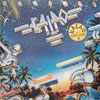 Kalao – Klortey Lagoon
Kalao – Klortey Lagoon
Kalao was a French recording project engineered by JP Massiera and a multicultural band, several songs have a Ivory Coast influence. The sound is quite unusual, sounds a bit like a ’80s predecessor of The Very Best. And the sleeve is as eighties as it can get with its thick airbrushed font and exotist jungle scenery.
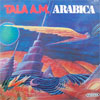 AM Tala – Sugar Lump
AM Tala – Sugar Lump
Andre-Marie Tala (Cameroon) released a couple of albums with heavy funk influences in the mid-’70s, of which ‘Hot Koki’ is still remembered today because it became one of the first examples of African tracks being re-recorded (without any reference or reimbursement) by an international star – in this case James Brown who released the carbon copy ‘Hustle!!! Dead on It’. By 1978, AM had caught the disco fever and released Arabica, an album with several string dance cuts.
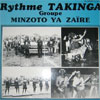 Groupe Minzoto ya Zaire – Vany
Groupe Minzoto ya Zaire – Vany
Minzoto was a band that supposedly grew out of a Congolese subculture in which youth dressed like cowboys; a Belgian missionary organised events for these youth and this was one of the results. Their albums were released in small presses in Belgium, and their repertoire ranged from classic rumba to songs that carry a heavy influence from seventies funk and soul. Rhythme Takinga, the album this song was taken from, is a brilliant melting pot of Congolese rumba with its sweet harmonizing, funky bass and horns and intricate percussion.
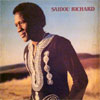 Saidou Richard – Taaba
Saidou Richard – Taaba
Saidou Richard, better known in Burkina Faso (or Upper Volta as it was called before 1984) as Seydou Richard Traoré, had already released three albums, acted in a movie (‘Sur le chemin de la reconciliation’ in 1974) and won several music awards before he embarked on an adventure performing and recording in the USA. His self-titled US debute came out in 1982. Mixing funk and soul with Manding pop music and other influences, the album sleeve notes celebrated his achievements around the world with shoutouts to everyone from the Dutch minister of culture who had awarded him ‘African composer of the year’ in 1979, to Georges Collinet (Afropop Worldwide) who at the time was with VOA.
Quoting from the liner notes: ‘when he came to the United States after impressive artistic achievements in his home country Upper Volta, a manager well known in the show business circles in the US met Saidou Richard. He tried to have him sign a contract and put on shows for him. He suggested that Saidou Richard present himself not as an African artist but as an American accidentally born in Africa. The manager thought that Richard’s music was of international quality but was convinced that coming from Africa was a negative attribute for marketing purposes in the USA where Africa is still wrongly seen as a backward continent. Saidou felt disgusted for such a dishonest proposal and became angry. He rejected the offered amount of money and contract proposed to him. He spoke to the manager in these terms: “I am from Upper Volta and I am proud to be African. I will take care of my business dealings myself and believe me I will make it, even in the USA, without changing my identity”‘.
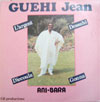 Guehi Jean – Dessahi
Guehi Jean – Dessahi
Guehi Jean (his friends knew him as Jean Guehi, but French literary tradition tells us to write names in reverse order), sometimes accompanied by his Ensemble, should be remembered as one of the heavyweights of seventies soul and funk in Ivory Coast. A number of his tunes have been reissued, like the breakbeat-heavy banger ‘Essemon Moupoh’. The album this is from remains under the radar, but as you may know by now, 1983 is the year, no less than 1973! There’s one other synth-laden tune on the LP while the other tracks are in happy pop mode.
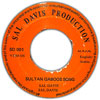 Sal Davis – Sultan Qaboos
Sal Davis – Sultan Qaboos
Tanzanian singer Sal Davis has had a fascinating career and is still musically active; his Makini, released in Belgium in 1969, is a sought-after funky mod classic that was reissued on a collectors label in UK in 2008. He also recorded Back in Dubai in 1984 which became a classic to the expat community there in the 1980s, participated in the UK Eurovision song festival in 1979, and further back he recorded a tribute to Qaboos, the sultan of Oman who is said to have turned his country from a poor, rural society to an oil producing wealthy state in the 1970s (and he’s still in power today, ever since 1970). This ode to the sultan was released on Sal’s own label; the B-side is a lounge love song with funky drums but the A-side is what it’s all about.
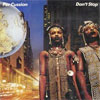 Per Cussion – Lucumi Suite
Per Cussion – Lucumi Suite
Don’t Stop, the 1983 album and single of the same name by Swedish group Per Cussion is counted as the first Swedish hip hop release (even though its vocalist Grandmaster Funk was American), it even was a favourite in the sets of Afrika Bambaataa. This song is based on Santeria music, originating in Cuba; Lucumi is the liturgical language used in the Santeria religion and it’s a dialect of Yoruba (Nigeria/Benin/Togo). Vocals by Wilfredo Stephenson from the Swedish latin group Hot Salsa.
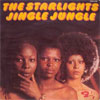 The Starlights – Jingle Jungle
The Starlights – Jingle Jungle
This is French artist JP Massiera recording under a different name, both sides of the single had an interesting mash-up approach to traditional recordings—a sort of sampling avant la lettre.
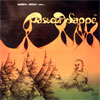 Pasteur Lappé – Bana Ashiko
Pasteur Lappé – Bana Ashiko
Cameroon singer Lappé released three albums and a couple of singles, and his output balances between corny love songs featuring his French girlfriend crying on record about waving goodbye at the airport, to brilliant synth driven wave like this one produced by Jacob Desvarieux (Kassav’) who also used the exact same instrumental version of a song from the Bana Ashiko LP on a Kassav’ record from the same year.
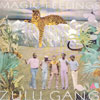 Zulu Gang – I Got a Magic Feeling Making Love
Zulu Gang – I Got a Magic Feeling Making Love
The same crew (but not associated with Afrika Bambaataa) including Douglas Mbida, Jacob Desvarieux and Jimmy Mvondo Mvele that recorded Pasteur Lappé’s 1981 album was also behind Zulu Gang, who made one album from which this single was taken.
 Paap Niang – Sama waye
Paap Niang – Sama waye
Blind singer/drummer Paap Niang sharpened his teeth with big names on the scene like Orchestre Baobab and Xalam before he released a solo album with this tune, which sounds very different from what most Senegalese artists were trying to do in the mid 80s.
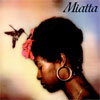 Miatta – Jungle Music
Miatta – Jungle Music
When Miatta Fahnbulleh (also spelled Fahinbulleh) moved to the USA in 1968, she had already started a musical career as a singer and even a dj – quite unusual for a girl from Liberia. Having lived in Sierra Leone, UK and Kenya, she found her way in New York, entered a singing competition at the Apollo, worked on an album with Donald Byrd and signed a deal with Ed Townsend, but none of this worked out – the deal with Donald Byrd got sour, and Ed’s studio burned down before they could record. Miatta moved back to Liberia and from there in 1977 settled to UK, where she recorded a self-titled album with ‘Jungle music’ as the opening song. Though Miatta’s career is full of ‘could have been’ moments (including recordings with Hugh Masekela), the records she did manage to put out are not hard to find but highly recommended.
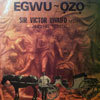 Sir Victor Uwaifo and his Titibitis – Egwu Ozo
Sir Victor Uwaifo and his Titibitis – Egwu Ozo
Uwaifo’s most interesting may be the ones he did with the Titibitis, combining a funky ’70s sound with ’80s electronics and a very eclectic musical palette. Egwu Ozo is one of his forgotten works, with its title track that starts out in 4/4 mode and builds up into a orgy of synths and horns.
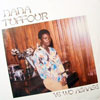 Nana Tuffour – Ye Wo Asaase
Nana Tuffour – Ye Wo Asaase
Like Alan Cosmos, Nana Tuffour released an album in Germany in the mid 80s. Highlife from the German Ghanaian community became known as ‘Hamburger highlife’, not for their love of fast food but because many Ghanaians had settled in the northern German town of Hamburg. Several German-Ghanaian acts experimented fusing its of funk and boogie into their music (think of Charles Amoah) while others remained more true to the Ghana sound, but even this jam (part of a medley) breaks down into a synth experiment halfway.
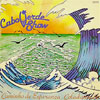 Cabo Verde Show – Terra Longe
Cabo Verde Show – Terra Longe
One of the succesful Cape Verdean diaspora bands, Cabo Verde Show released a number of albums and 12 inches in France and Portugal. This effort from 1979 is from the album ‘Caminho De Esperança’ with a synth based approach to coladeira, the most prominent musical genre from the CV islands.
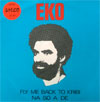 Eko – Fly me back to Kribi
Eko – Fly me back to Kribi
Cameroon born Eko has been known in a certain scene of diggers for his mighty disco funk track ‘Kilimandjaro my home’, but recently this little 7 inch started showing up. The ‘Safari disco sound’ sticker on our mixtape cover is originally from this single, and it refers to Safari Ambiance, the Paris-based label that seems to have backed this release.
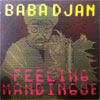 Baba Djan Kaba – Folila
Baba Djan Kaba – Folila
The rule of thumb maintained by some diggers that anything recorded after 1984 must sound too clean and digital to possess any soul, would imply overlooking gems like Baba Djan’s ‘Feeling Mandingue’ album – no year is mentioned on the sleeve but the artwork looks very ‘late eighties’. The album was arranged by Kante Manfila, known as guitarist in Les Ambassadeurs.
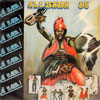 Ali Baba – Hadiza
Ali Baba – Hadiza
This album is easy to pass on, as it is usually stuck in the euro bin and its cover looks too outrageous to be taken seriously, yet there’s the hidden gem of Hadiza, which sounds like afrobeat translated into a electronic setting with sublime synth licks. Ali Baba was once a member of the Ballet National du Cameroun. His album was released in 1984 and distributed by the same guys that did the ‘Take me back to Kribi’ single by fellow Cameroonian Eko.
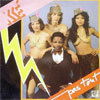 KKE – Money
KKE – Money
Song from a mysterious boogie funk/soul/disco record by Congolese singer Ali Nkeoua with an apparently Dutch backing band, released on a tiny label in the Netherlands. Not sure for which market but the only copies that ever showed up were found in Holland. Special props to the sleeve photography in which our singer – who looks as if he’s about to perform at a wedding – is surrounded by a few sparsely dressed ladies. Ali Nkeoua was also in Sanganas (aka Sanganas Five), a band that toured Europe around the mid 70s and recorded a few singles in funky disco mode.
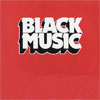 Remi Kabaka – Aqueba-Masaaba
Remi Kabaka – Aqueba-Masaaba
Nigerian drummer Aderemi Kabaka performed and recorded with some of the biggest names in the music industry including the Stones, Paul McCartney, Steve Winwood and Hugh Masekela (his son, who bears the same name, is one of the voices behind the Gorillaz). The recordings that were to be released as his second album by Island Records never made it past the promo stage, and consequently Son of Africa is very hard to come by; too bad because it’s a record loaded with heavy afro funk tunes. This is the only track that got a (limited) release on a Island Records compilation in 1977.
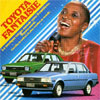 Miriam Makeba – Toyota Fantaisie
Miriam Makeba – Toyota Fantaisie
When this Japanese promo single for Toyota was released in 1980, Miriam Makeba was living in Guinee-Conakry, so it’s no surprise to hear her sing fluently in French, and in English on the flip side of this effort to sell cars on the African continent. The fact that it was pressed on vinyl in Japan is more puzzling; perhaps this was handed out as a promo back there – although the message stating that this record is not for sale is in French, was this shipped to the Francophone world then?
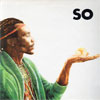 So Kalmery – Ujamaa
So Kalmery – Ujamaa
This song is from another album that doesn’t deserve to be in the euro bin, but that’s where my copy was found. So Kalmery is another great voice from eastern Congo who deserves more recognition for his oeuvre which spans four decades. He arrived in Europe while touring with Congo’s grand maestro Franco, and So, featuring his band Ujamaa, was released in 1986.
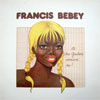 Francis Bebey – Le Grand Soleil De Dieu
Francis Bebey – Le Grand Soleil De Dieu
From Bebey’s often overlooked 1986 effort, Si Les Gaulois Avaient Su, which you have to look up just to marvel at the cover art. In 2011, some of Bebey’s fusion of electronic and acoustic sounds got compiled on ‘African Electronic Music 1975-1982’ but this track was not included.
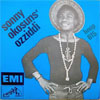 Sonny Okosuns Ozziddi – Steady N Slow
Sonny Okosuns Ozziddi – Steady N Slow
Incredibly hard to find single-only release by the great Sonny Okosun, the B-side is equally great. Both sides were later rerecorded and released on his albums (Ozidism and Fire in Soweto), but the original versions remains superior. If anyone has a spare picture sleeve, please call since our copy came without.
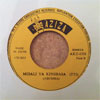 Abumba – Mibali ya Kinshasa
Abumba – Mibali ya Kinshasa
Being the brother of one of the greatest voices in African pop throughout the 1970s and ’80s, Abumba Masikini never reached the star status of his sister Abeti but he got to perform at the Zaire 74 concert held on the occasion of the Muhammad Ali vs. George Foreman boxing match in Kinshasa. His performance of this single was captured on camera and finally released along with the Soul Power documentary in 2009. If you were curious about the artwork for ‘Afro cosmic club 2’, the pineapple drawing was taken from Abumba’s only album ‘Zaïroisement Votre‘.




DJ Rhythm & Hues’ Best Albums of 2014 | TOTAL ECLIPSE
January 8, 2015 (16:21)
[…] DOPE MIXES of 2014 Mo Kolours’ Drum Stalking Mix DJ Gioumanne’s Afro Cosmic Club Volume 2 Future Sound of Mzansi mixtape series curated by Fantasma and Spoek Mathambo DJ Lynnee Denise […]